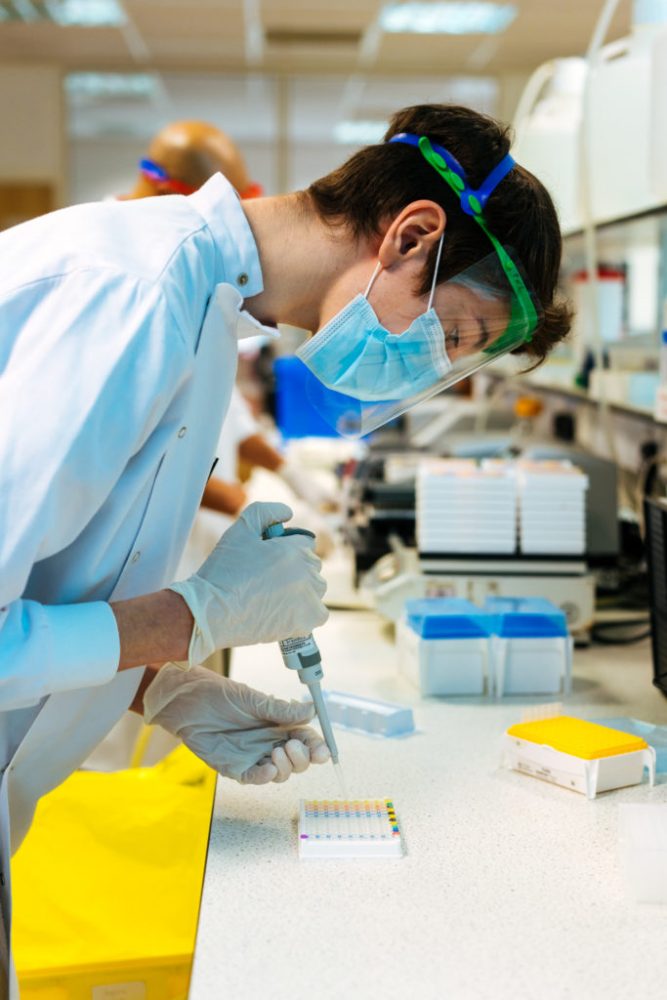Home-to-laboratory test specialist YorkTest has revealed the initial results of the first study of Covid-19 antibody levels using home testing kits.
The trial included those who have been fully vaccinated, those who have only received a single dose as well as people who have had Covid-19 and not received a vaccine.
Those who have had two doses of a vaccine experienced a 4,500% average increase in antibody levels when compared to those people who have only had a single dose.
Peak protection happens three to six months after two jabs – after which the antibody levels start to drop, suggesting that booster vaccinations may prove vital in the long-term approach to containing Covid.
Participants who have recovered from Covid-19, but have not been vaccinated, had higher levels of antibodies on average than those who have only received a single vaccine.
Now YorkTest says this kind of test could become the most important one in the future fight against the virus and they suggest the Government should carry out many more.
What the data shows

The British Medical Journal has defined a high level of Covid-19 antibody protection as being over 250 U/ml.
The YorkTest trial, using the home Covid-19 Immunity Tracker Test, found that:
- After one dose of a vaccine (without previously having Covid-19), average antibody levels were 24 U/ml.
- After two doses of a vaccine (without previously having Covid-19), average antibody levels were 1,084 U/ml.
- After recovering from Covid-19 but without being vaccinated, average antibody levels were 95 U/ml.
- The average level of antibodies to Covid-19 was 997 U/ml up to 100 days after the second dose of a vaccine, which then increases by 25% to an average of 1,242 U/ml between 100 and 171 days. This, together with initial latest data showing reducing antibodies, suggests peak protection three to six months after receiving a second vaccine.
- From limited initial trial data, those people who have both had Covid-19 and are also double vaccinated recorded the highest levels of antibody protection, over 2,500 U/ml.
[tptn_list limit=3 daily=1 hour_range=1]
Commenting on the findings, Dr Gill Hart, scientific director at YorkTest, said:
“This may have been a relatively small trial but the results are conclusive. Put simply, the most important thing for public health is to ensure that as many people as possible have two vaccinations.
“But, it’s important to remember that isn’t necessarily the end of the story.
“Although results of our initial trials show that immunity is reaching its highest point three – six months after a second vaccine dose, there is some suggestion that antibody levels may start to decrease from that point.
“Our study is ongoing and the Government has already announced plans to provide antibody tests to those testing positive following a PCR test. However, our results show there’s an argument for antibody testing to be rolled out more widely.
Dr Hart says this kind of test could well become the most important one we have in the future as it helps to track how well our immune system will be able to fight off the covid virus.
“People need to be mindful of their own antibody levels so they can make informed decisions about their day-to-day lives.
“Granted, we have heard that a booster programme is coming but we still don’t know when that will be and who will be included.
“Our trial continues and we have now entered the crucial phase where we start monitoring antibody levels six-nine months after a second vaccine dose.”
The study of 46 participants used the Covid-19 Immunity Tracker Test, which is a 99% accurate, MHRA (UK Government) approved test for antibodies to the Covid-19 spike protein, which can be done in your own home.
About YorkTest
YorkTest has 39 years’ experience as a leading provider of quality-assured and accurate food intolerance, allergy and health tests. It has its own audited and certified manufacturing and testing laboratory.
The Covid-19 Immunity Tracker Tests are provided in collaboration with non-profit organisation Testing for All and AccuLabs Diagnostics UK.
For more information on YorkTest, visit www.yorktest.com.
